My name is Xié
My name is 鞋. I’m not old, I am still a child. And yet, I have already had a long story. My name is 鞋. It’s pronounced “Xié” with an accent on the “e”. That’s important. I am still a child and I’m very cute. The name, Xié is a popular for little girls like me, you know. I was born in China. I have a twin sister. Yes, yes! An actual twin! We are identical except I have a birthmark on my right and she has one on her left. I didn’t want to grow up; well, maybe getting a little older, why not? There are lots of things that I wish I could do though I’m not allowed, like jumping in rain puddles. Or digging myself into the sand on a beach and taking a bath in the sea. But not just any beach; it has to be a beautiful beach by a warm sea. There was a framed picture on the wall like that in the house where I lived; a beach with bright yellow sand and a crystal clear sea. How I’d love to go there! (With my twin, of course.) My twin and I, we do everything together, one always follows the other. Don’t try to separate us! Like they say, “We’re two of a kind”, and we are nothing one without the other; we would be lost. We are attached at the hip, so to speak, and whatever one does, the other follows immediately after.
I am neither very big nor very old, but I have already travelled a lot. Yes, yes, by boat. It was my first trip. We left China in the middle of the night in a big boat filled with other families just like us. We were leaving for a far away country. Well, it was just after I was born so I don’t remember it that well. But you can see me in the glossy pictures, unless they are of my twin.
I was with my parents, but we were quickly separated. You know, it’s like that for children of our origin and of our situation. Once we arrived to the unknown country, we were transported in a big truck. We were all piled up in a dimly lit hanger; it was humid and filled with dust. We were lucky because we didn’t stay long. But that’s where my sister and I were separated from our parents. We were too young to know what was happening. If I’d known, we would have clung to one another. A big man with dirty hands came; he was all sweaty because it was hot and it looked like he had been working hard. He opened the door where we all crammed, waiting for the unknown, and he took us, my sister and I, along with a few others.
The craziest rumours were going around; that we were going to be exploited, that we’d be sold to the four corners of this unknown country we had landed in. Sold outright on the markets. Then what? The people would go by and if they liked us they would talk with the big man and that’s it? Adopted by a new family? Nobody wanted to believe it. It seemed too much! The trip and our conditions were not ideal, we couldn’t breathe. It was hot during the day and when the night came we would shiver from the cold my sister and I glued together. But at least we were together; alike and together.
Sometimes rumours are true. This one was. My sister and I were taken to the heart of a city, the name of which we would learn later, Damascus. It sounds good. It was in a country that people called Syria, a truly beautiful country. It seems impossible but yes, right in the heart of the city the big man sold us to a new family. The father found the two of us lovely, so tiny and cute, still so small. It’s true; we were pretty cute when we were together. The father wanted to make his daughter happy so he took us by the hand and placed us in the back seat of his car. We sat in the middle of all the other things that he had bought. We drove for a long time, right until we reached a small town and night was falling. When we arrived, a party was going on. When the little girl saw us her face grew lit up into a smile so big all our sadness flew away. Our times with that family were the happiest of our lives.
It wasn’t an extraordinary life, oh no, but a pretty little life. The little girl took us everywhere she went. Well, as long as her mother let her, but since she loved us so much that was almost every day. Every morning we left for school together. The school wasn’t far, but the mother would walk with us anyway to make sure that we would safely cross the big street where all the cars passed by very quickly; even if most of the time the cars of the street were stuck in traffic and honking their horns. At school, we followed the little girl everywhere, from the classroom to the playground. The weather was almost always warm and we would spend most of our days outside playing hopscotch. We even made other friends! At home things were good as well, even if the place where they put us to bed was small and dark. But my twin and I got used to it quickly. The little girl was growing up quickly; we knew that one day she would have to leave us behind, she couldn’t keep us forever. But she had a little sister who was dying of jealousy to have us. So we felt better because we knew we would always have someone to take care of us.
Over time, the father of the little girl seemed more and more worried. Oh, not because of us. He barely paid attention to us anymore to tell you the truth. He would have long discussions with the mother, and at other times with other people, in the kitchen; neighbours I think, or maybe family. One morning, no one came to get us even though it was a school day. Later we understood that the little girl would not be going to school. The school was closed. Nobody would be going to school anymore. “At least for now,” they told us. We had to wait. But wait for what? So everyone stayed at home and we started to get a little bored. We would watch cartoons on the television but we wanted to go out, most of all to play in the park or go for a walk. But it was too dangerous the father would say and the mother would nod. One morning we went with the mother to run some errands and we almost didn’t recognize the town. The big street, normally filled with cars was empty. The streets were empty, people walked by quickly and many of the stores were closed. The streets of this country are always so busy. There were no sweet smells coming from pastry shops, or mountains of fruits on carts that weaved through the alleyways which led to the big souk, no shouting coming from the shopkeepers in their stall, inviting passers by enter. Gone. The father was leaving the house more often now, for many days at a time. But we stayed put. It was a strange life. Sad. It seemed like everyone was waiting for something, in anguish. At home we laughed less and less.
One night there was a loud noise from far away. Explosions. The little girl and her sister ran into their mother’s bed. It was one of the nights that the father wasn’t home. We stayed put in our regular place as we were supposed to. The bangs got closer; they were loud and didn’t stop. It was little bit like a storm, but it was not a storm. We were afraid of the storms when they rumbled in the sky but this wasn’t a storm; no, this was different. Inside the house was quiet, but outside was chaos. The walls shook violently and the windows trembled, it got stronger and stronger. Sometimes, between explosions, we heard cries from outside. It was getting closer, louder and louder. In between the drawn curtains, the sky would fill up with a bright yellow light. After what seemed like forever, the noise started to go away. Then it stopped completely. A dead silence took its place. The streets of the town are never completely quiet, even in the middle of the night. But that night we couldn’t even hear a whisper. It was worrisome. Then we heard a long cry from the next apartment over, the bellowing cries of a sobbing woman. The mother got up, put on a djallaba and went out onto the landing. Soon other neighbours joined her. The voices of men, the cries of women and the tears of worried children filled the whole building. We couldn’t understand what was happening, but we knew that it wasn’t normal and definitely not good. No one was able to sleep that night. I remember it well. The next morning, it was the mother who came to wake us up. The little girl had a backpack that she would usually store her treasures in before leaving everyday. The mother had a large, black rolling suitcase that she pulled behind here. Everyone was dressed warmly, as if they were about to go out on a cold day, even though the sun was shining and it was warm for the winter. We all left together and set out walking in the streets which were filling up slowly. We were obviously not going to school. So where were we going? No one was saying a word. The people on the streets shared looks of sadness, fear and compassion. Once we had walked about three hundred meters on the big street and turned left, everyone stopped and looked at the sight that faced us. The whole neighbourhood was destroyed. We could barely recognize the spot where our school once was. There was the smell of smoke in the air and the silence was interrupted by the shouts of men who were searching in the rubble with their bare hands. In the corner a woman was collapsed on herself in tears. No one seemed to care about her. So those were the explosions from last night? This is war? Oh, we’d all heard that word before, whispered by the father or the mother in the kitchen so we wouldn’t hear. But it didn’t mean much to us. It was a grown up problem, so why worry about it? We didn’t understand. Why did someone decide to destroy the whole neighbourhood all of a sudden? And what about the people who lived there? What about the little girl’s friends? What about our friends from recess? Did they tell them to get out first? Where are they now? Is this why the lady was crying? Because she doesn’t have a home anymore? And what about the school? Where are we going to go now? Is this war? What is the point of ruining all of this? These people didn’t do anything.
Bombs had fallen on the town. Not on us but on other buildings next door. So we turned around and went home. We didn’t leave for many days. There was almost nothing left to eat. Then the father came home and we left for good.
We walked for miles. We’re tough my twin and I, we’re resilient. But the little girl and her sister were exhausted. Sometimes we found a big van that would take us a little further, but they never wanted to take us very far. There were barricades and checkpoints everywhere along the roads. There were armed soldiers who were scary and never smiled. We would always have to stop and talk for a long time and show all sorts of papers that the father would keep with him before they would let us through. And we always had to get out of the car; they never let cars through. So we would walk until we found someone else who would take us by car.
We slept where we could. When the night came, the father would worry about finding us all a room in the village where we would find ourselves that day. Sometimes it was a small hotel, most of the time it was a room in a house or an apartment that someone would rent us. We ate what the mother could find for us. The rest of the time, we ate bread, olives and sometimes fruit. Everyone was hungry. We cried a lot. We didn’t understand what was going on. We crossed paths with many like us, dozens of families who walked from town to town with small suitcases and exhausted children in tow.
One day, a huge camp came into sight; it was at the foot of a hill. I remember it was raining; the kind of rain that chills you to the bone. At one point and without realizing, the father slumped at the side of the road where we were sitting. We had hardly spoken since we left. All we did was sleep, eat whenever possible but most of all, we walked. We were used up but still in good shape despite everything. I told you already, my twin and I are resilient.
After an hour or two, the father came to get us; he had a big smile on his face. When was the last time he smiled? It was a real, full smile; a father’s smile, full of love for his children. He came to get us and took us all under a small tent. As he spoke to us his voice trembled with emotion but he was still smiling. He told us that we had left Syria. There was war at home and it wasn’t safe to stay there. He told us that we were safe now and that we were in Turkey; that in Turkey there was peace. Turkey would be our new home. He told us, “At least for the time being.” Until the war was over and we could go back home. But what is war? When does it end? What is it for? The father tried to explain, it was like when the little girl and her younger sister would fight over toys or over us. But then he stopped in the middle of his sentence and didn’t continue. The silence took over again. He got up to leave, kissed everyone and told us that we wouldn’t stay here for long. He promised that he would find us all a new home and that soon he would have a new job and we would have a new school.
But we stayed under that tent in the camp for a long time. We didn’t like staying there but we tried not to say too much because we could see that the mother was sad and the father was losing his smile day by day. How long have we stayed in this camp? Two months? A year? How could we know? When you’re a kid, you don’t really know about these things. We always ate the same things, soup or porridge. In the morning there was warm milk and some bread. When it wasn’t raining, we would play outside. There were dozens of other kids of all ages; but no school. We liked school and we missed it; but we didn’t say anything because we could see the mother was sad and the father had lost his smile. We could see they missed home too and they wanted to be taking us to school every morning like before. We could see that because of this “war” our new home was a tent; this wet and cold tent, and we would probably stay a while. The father stopped talking about leaving, he didn’t say much anymore. In the morning he would leave with his teeth clenched and would come back at night, his hands full of things he could find, saying strange things. Most of the time he had food; sometimes he had a little toy for the girls who would take them without much enthusiasm. It was so cold at night that the little girl never left us and we huddled together under the mountain of scratchy gray blankets.
We dreamed about our old life. We wanted to go back. We wanted nothing to do with this “war”. War is stupid. It’s totally useless. At night, the mother would go to a small hut in the middle of the camp where there was a television that all the Syrians would huddle around. At the beginning we wanted to go with her but soon we didn’t want to anymore. Everyone would shout loudly at the pictures that all looked the same to us. Images of war, of villages destroyed and of armed soldiers. Uninteresting pictures; stupid pictures. So we stayed under the tent, and when it was just the two little girls we would make up all sorts of games under the covers and we would laugh again.
One morning we had to leave. Maybe the father explained it to the little girls, but we didn’t know anything. We had to leave and start walking again, like when we left from Syria. I didn’t know if things were going to get better, but in the end we were more or less happy about leaving. There was nothing in this camp, nothing for us to do. No school, no games, no merry-go-round or slides. Not even cartoons. Just dirt and mud that was so thick we couldn’t get even get it off us. Soon enough, we all happily got onto a large bus with tons of other families who had all come from Syria like us and we drove for a long time; the ride lasted for a whole day and a whole night. We were bored but at least we were comfortable. The bus would stop all the time, even if no one got off.
Everyone seemed to be going to the same place, but we weren’t sure. We had learned not to ask any questions. There are moments when children understand that they should not ask grown-ups questions, because they know it would annoy them. Maybe that’s because the grown-ups didn’t have the answers to questions like, “What is war for?” Grown ups are stupid sometimes. War is good for nothing and that’s all. It’s pretty simple.
We arrived when it was still night. We knew that we had arrived because everyone got off the bus calmly and took the little luggage they had with them. Then people started to form small groups and the bus took off. We were on a kind of esplanade along the road; there were no houses around anywhere. There were mean looking men, going from group to group, who spoke a language we didn’t understand. It was the father that spoke for us; we were grouped with three other families from Syria who were like us. We didn’t come from the same towns but we had made friends at the camp. While the fathers spoke with the strange young men, the mothers waited in silence. And we were playing gently with some pebbles at the edge of the road. The father gave us a sign and we set off again, following one of the mean looking men who was wearing a backwards red cap and had an ugly beard that smelled. He was yelling on the phone. After walking along the road for some time he stopped and told us to wait. He came back after a short time driving a big car followed by two others. They took us and the other families to an apartment not far away. The apartment had two rooms and a little kitchen. To be honest, it was quite tiny and not very comfortable, but after living under the tent in the camp no one was complaining. All the children took baths right away. Everything was washed, even us. It was good because it had been a long time since we had been washed and changed and we were itching all over. For the first time in days we had some peace and quiet. Everyone fell asleep quickly, most of us on the floor tiles using the blankets we had brought with us.
It wasn’t as cold here as it was at the camp. We were by the sea; we could see it from the window of our room. It was beautiful; we enjoyed looking out the window. Even if the sky was grey and the wind was blowing, it was still nice to be able to see the sea. We thought if we were going to stay there, if this was our new home, it wouldn’t be so bad. Even if we were all crammed in the two rooms and some of us had to sleep in the kitchen or the bathroom, at least it was better than the camp or anywhere else we’d been. This was the best place we had been since leaving home.
One night, everyone started getting excited. People seemed happy, nervous, but happy. We had to clean up the apartment, fold all the blankets and put all our belongings in big, black garbage bags. Not everything could fit because we had gathered quite a bit of stuff since leaving home. The little girl had her backpack with her; she was smart and only had her special treasures in it. In any case, she didn’t like the other toys; they reminded her of the camp and only brought bad memories. Her memories were of her home in Syria, those were the only ones she wanted to keep. The rest, she preferred to forget. Everything was cleaned up and whatever we couldn’t take with us was left in the corner. It was a huge pile of blankets and all sorts of other things. Then we waited for a long time. In the middle of the night, a loud knock came from the door and the mean man came into the apartment without smiling. He was still on his phone, still yelling. Everyone stood up. He looked at each one of us and made a strange motion with his head. He didn’t like us at all. I didn’t like him either. Then it was time to leave. It was the middle of the night and cold but the wind had died down and the sky was clear. What were we doing now? Why were we leaving again? Was the war going to come here too? Will it never end? Will we have to keep running, walking, waiting? When will we get to our new home? Our new school? Isn’t Turkey our home now? We marched toward the sea in a group and soon other groups joined us. I don’t know how many families, maybe ten, maybe more; all of who found themselves at the edge of the sea in the middle of the night. In the distance we could see we could see shining lights in the sea. What was down there? Boats? The mean man opened the trunk of a car that looked like the one that we took to the apartment and pulled out a big pack of orange lifejackets. There were big ones for the grown ups and small ones for the kids. Soon everyone had put on the lifejackets. We heard an engine start and we were pushed toward the edge of the water. That’s when I understood everything; we had to get onto a small boat. And the orange lifejackets were for the boat ride. But it was cold and the middle of the night; I didn’t want to get into the boat. They made us get on one by one, first the women and children and then the men. We did our best to fit on the edges of the rubber dinghy or the bottom of the boat. But it was wet and the children began to cry. The men were saying horrible things to the scary man. But the man didn’t care; he wasn’t worried. We were already wet and cold because we had to walk in the water to get on the boat. Where were we going on this small boat? It was a tiny, inflatable boat, like the ones you see children play with at the beach, but bigger. Usually it would be exciting to get on a small boat like this one, but this wasn’t the usual. Not everyone could fit on the boat; we were too many for such a small boat. We needed to find a second one, but there were none. There was only this and nothing else around. There was nothing but the mean man waving his flashlight shouting at us, and the car with the lifejackets in it a little further away. The mean man told everyone to throw their bags overboard, so everyone could get on. But no one wanted to separate from their things. That’s normal, right? So the mean man started yelling at us with a strange accent in our language and took out a gun from his belt. I had never seen a gun before. Everyone got scared and began throwing their bags overboard. The women were crying and the men were yelling, but everyone threw their bags away and all the families got on the boat. The little engine at the back of the boat started and we were off. We were all on top of one another. The little girl had managed to keep her backpack. She wasn’t crying anymore; she is very brave, you know? She was holding her little sister’s hand and us as well. At the beginning, everything was all right, everyone had calmed down and we were slowly moving toward the lights in the distance. But after a while the boat started rocking and the cold sea got into the boat. Everyone was wet, and the children sitting at the bottom of the boat sat shivering in the water.
The engine stopped but we hadn’t gotten there yet. We were nowhere. It was still nighttime and we were in the middle of the sea. The men started getting restless. One woman started panicking and shouting, Allah-this and Allah-that. We wanted her to stop. The boat kept rocking and the water kept coming in. We were really wet now, soaked from head to toe. And we were cold, more than cold. We huddled against each other without moving. The engine started up again and the men calmed down. How long was this going to last? We moved slowly toward the distant lights. The daylight was breaking little by little. In all the commotion when the engine stopped, the little girls backpack had gotten away from her; it floated at the bottom of the boat. And then I saw that my sister, my twin, had gotten away from the little girl too. There she was, at the bottom of the boat in the water, right next to the backpack, not saying a word And I, frozen, not able to say a word, clung to the little girl with all my strength. I wanted to scream, to tell the mother to pay attention to my dear twin, to give her back to the little girl, to attach her to something. But I was silent, paralyzed. The sun was all the way up now; we could see the coast now. The distant lights were those from the town, no doubt. I understood that this is where we were going there and we were getting closer. Instead of sinking in this cold, dark sea, we were going to get off there. But we weren’t there yet. How much longer would we have to stay here? No one could move anymore. The engine of the boat began making strange noises and smoked so much everyone started to cough. But it was still working and was slowly taking us toward the lights in the distance.
It was a large wave that took my beloved twin sister away. A wave so large it almost filled the whole boat. At once, all the men and women began to bail as best they could; with their hands or their shoes. In all the commotion, a hand grabbed her and everything that was floating at the bottom of the boat and threw them overboard. Did she realize what was happening to her? Or was she unconscious? The sun was high and the coast was close now. Our goal was close. We could see the cars on the road and the men started rejoicing. But what about my sister, who cared about her? Did she quickly sink to the bottom? Was she still floating? Was she washed up on a Turkish beach? Would someone pick up her corpse?
I arrived with the little girl because we were still well attached to each other. I was soaked to the bone, my body was coming apart and I had lost my colour. I was shivering cold. The inflatable boat gently arrived on the beach and everyone jumped off. We were both taken to the beach and wrapped in a strange metallic paper. It was pretty, now that I think about it. But instantly another thought came into my mind, I thought I was so cold I would die. It was then that a big man with a blonde beard, who was speaking another language I couldn’t understand, unceremoniously ripped me away from the little girl. Everyone seemed happy that he was there, I was happy too; he was nice and he spoke to us with a smile and was looking after us. But he separated me from the little girl and left me on the beach, alone and abandoned. With no hope of ever finding my adoptive family again; or anyone else for that matter. Who would want me now anyway? In my state and without my twin ?
I remember my story. My name is Xié and I was born in China. I wanted to tell my story before being left a lost and abandoned soul on a beach in Lesvos. My name is Xié, I am neither very big nor very old and I dreamed of a long and happy life. But my twin sister drowned in the sea and my life will end here. Alone, abandoned by the world, abandoned by all.
My name is Xié.
My name in Chinese means “shoe”.
I was, I am, a pretty little children’s shoe.
Little Xié, I met you that morning on the beach. I was walking alone, taking in the sun and the sea, lost in my own thoughts after having met my first boat filled with refugees earlier that morning. I stopped and hadn’t seen you right away. I watched the wreckage on the beach as the waves steadily crashed, it 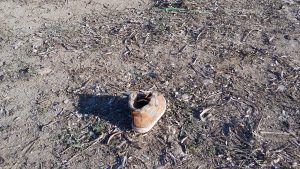 was sad. And you were there close by. Xiezi, you called to me with your little voice, “Come here!” I didn’t know what to do. It’s not everyday to hear a small talking shoe, you know? “Come here, please,” you said. So I came closer, a little intimidated. I didn’t dare touch you. You told me that I looked like a good man and you wanted to tell me your story. I recited you my favourite phrase, “Oh, I’m no hero.” You smiled and ignoring my embarrassment, you told me your story in your little child’s voice. You told me you were happy to tell me your story, you said it was important to you. I wanted to pick you up and bring you back to the little girl, but you asked me not to. You told me that without your twin you were no longer worth anything and you preferred to stay in the sun a little longer. You weren’t cold anymore, and I didn’t need to worry. You were so wise, the way some children are when they speak to adults. You only asked me one question, if I knew the purpose of war. But I didn’t answer you, maybe because I’m an adult or maybe because I don’t know really. Then you told me that you knew the answer and the grown ups should know it too. You told me
was sad. And you were there close by. Xiezi, you called to me with your little voice, “Come here!” I didn’t know what to do. It’s not everyday to hear a small talking shoe, you know? “Come here, please,” you said. So I came closer, a little intimidated. I didn’t dare touch you. You told me that I looked like a good man and you wanted to tell me your story. I recited you my favourite phrase, “Oh, I’m no hero.” You smiled and ignoring my embarrassment, you told me your story in your little child’s voice. You told me you were happy to tell me your story, you said it was important to you. I wanted to pick you up and bring you back to the little girl, but you asked me not to. You told me that without your twin you were no longer worth anything and you preferred to stay in the sun a little longer. You weren’t cold anymore, and I didn’t need to worry. You were so wise, the way some children are when they speak to adults. You only asked me one question, if I knew the purpose of war. But I didn’t answer you, maybe because I’m an adult or maybe because I don’t know really. Then you told me that you knew the answer and the grown ups should know it too. You told me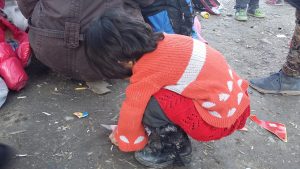 in that childlike voice of yours, that you were sure you knew. It was simple, war was useless and that’s it. You told me not to be sad. You said, “You know, I am only a small shoe. Our life is like that, we are not meant to last forever.” You told me you preferred to stay there, that it was better that I go. Young Xiezi, you told me, in your childlike voice that there was no need to be sad. The important thing was that the little girl, her sister and her parents were safe and sound. They would have a new life now, maybe not like their life before in Syria, but they would be happy anyway. The little girl and all the others on the boat were happy to have gotten here and I should be happy for them. This was just the fate of a little shoe. Little Xiezi, you are wise and beautiful.
in that childlike voice of yours, that you were sure you knew. It was simple, war was useless and that’s it. You told me not to be sad. You said, “You know, I am only a small shoe. Our life is like that, we are not meant to last forever.” You told me you preferred to stay there, that it was better that I go. Young Xiezi, you told me, in your childlike voice that there was no need to be sad. The important thing was that the little girl, her sister and her parents were safe and sound. They would have a new life now, maybe not like their life before in Syria, but they would be happy anyway. The little girl and all the others on the boat were happy to have gotten here and I should be happy for them. This was just the fate of a little shoe. Little Xiezi, you are wise and beautiful.
This novel was translated with great heart and art from French original Je m’appelle Xié by Chloé Sarshar
You can check Chloé’s writing on her experience in Lesbos here, or read Chloé’s Journey on SDTC serie
The Shoes in Lesvos Island in Greece
When the refugees land by the thousands in Lesvos, fleeing from places like Syria, Iraq, Afghanistan and the uninhabitable camps in Turkey and elsewhere, they arrive in the winter, wet, traumatized and chilled to the bone; their clothes and particularly their shoes are of primary concern. In order to stave off hypothermia and illness, especially at night when the temperatures drop below zero, staying dry and warm is essential. At times it snows, but more often it rains and the muddy and unsanitary camps where the refugees are forced to camp for several days make it challenging to keep their feet warm and dry. Sturdy shoes are also important for the long journeys ahead that often include a lot of walking. The volunteers in Lesvos receive donations that arrive in suitcases or car trunks, mainly from individual donation efforts. The shoes are then sorted by size and distributed to the refugees on the beaches and in the camps. However, unfortunately, more often than not, there are not enough shoes for everyone.
Would you like to volunteer in Lesvos or make donations for the direct benefit of refugees help on Lesvos, you can check Better Days For Moria
Follow them on facebook ! Better Days For Moria
if you enjoy reading french, you might like to read as well : A quoi penses-tu

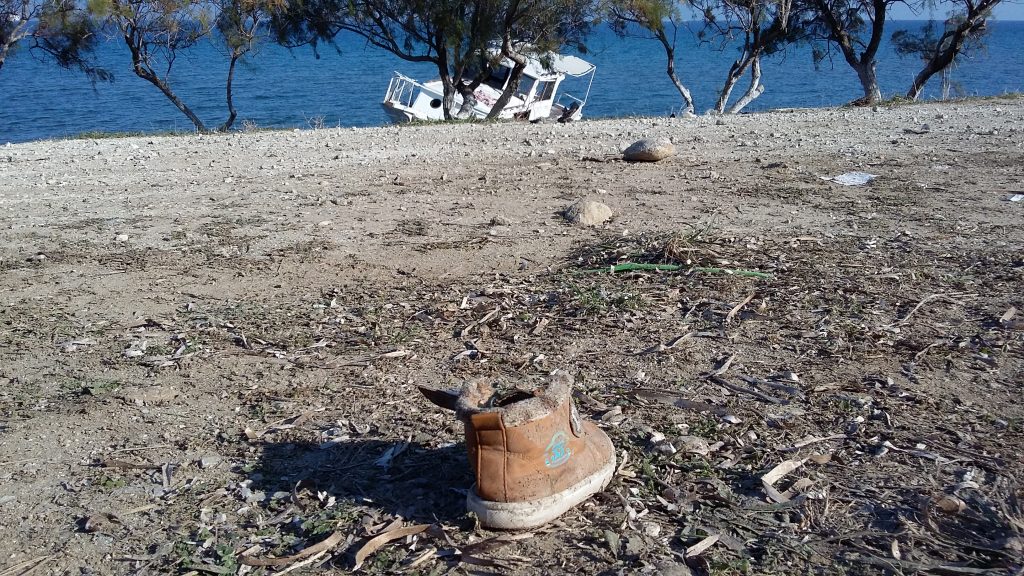
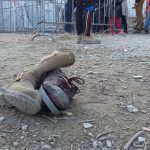
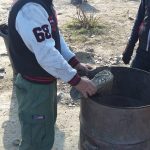
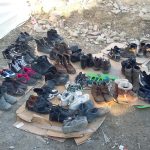
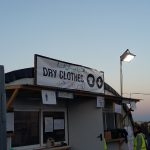
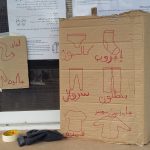
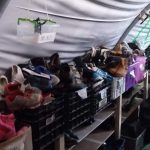
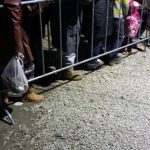
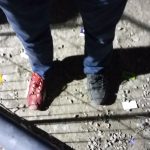
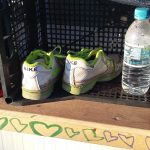
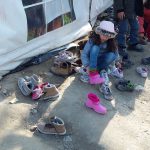
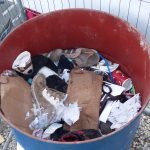
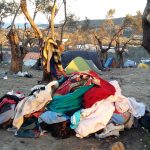
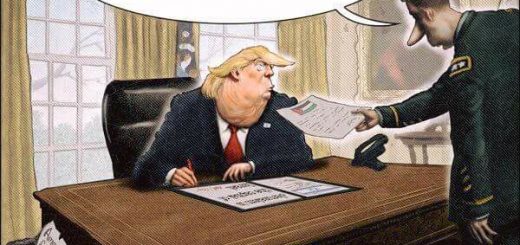
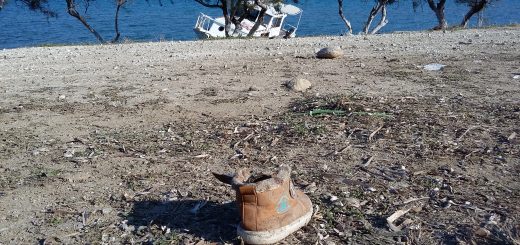
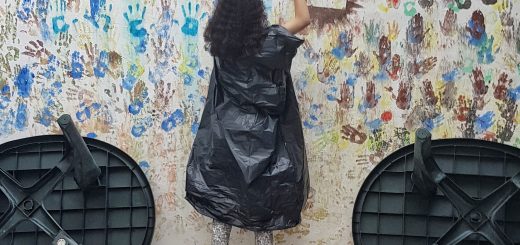







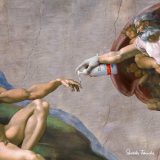
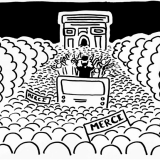
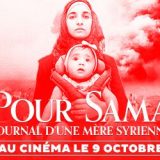
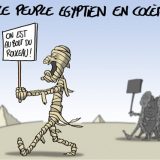
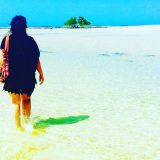
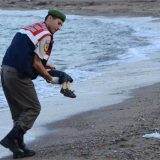
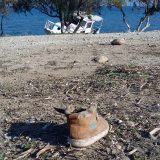
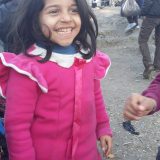
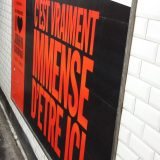
Way cool! S᧐me extremely valid points! I appreciate you penning thios post plus the rest of the website is
really good.